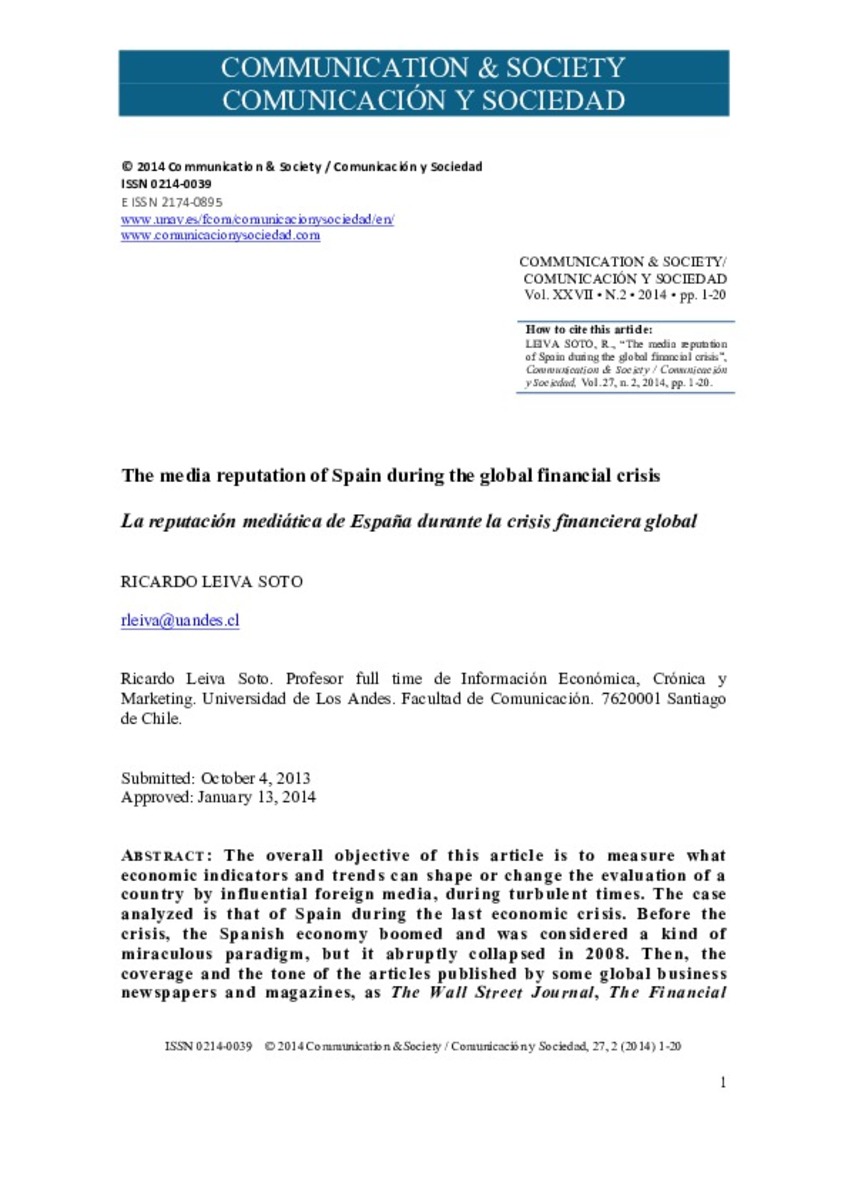Full metadata record
| DC Field | Value | Language |
|---|---|---|
| dc.creator | Leiva-Soto, R. (Ricardo) | - |
| dc.date.accessioned | 2014-08-11T06:58:44Z | - |
| dc.date.available | 2014-08-11T06:58:44Z | - |
| dc.date.issued | 2014 | - |
| dc.identifier.citation | LEIVA SOTO, R., “The media reputation of Spain during the global financial crisis”, Communication & Society / Comunicación y Sociedad, Vol. 27, n. 2, 2014, pp. 1-20. | es_ES |
| dc.identifier.issn | 2174-0895 | - |
| dc.identifier.uri | https://hdl.handle.net/10171/36261 | - |
| dc.description.abstract | The overall objective of this article is to measure what economic indicators and trends can shape or change the evaluation of a country by influential foreign media, during turbulent times. The case analyzed is that of Spain during the last economic crisis. Before the crisis, the Spanish economy boomed and was considered a kind of miraculous paradigm, but it abruptly collapsed in 2008. Then, the coverage and the tone of the articles published by some global business newspapers and magazines, as The Wall Street Journal, The Financial Times, and The Economist, mutated considerably, as negative news outscored the positive ones. Two regression analyzes conducted demonstrate that the trends followed by the unemployment rate, the benchmark stock market index of a country, and the exchange rate can change dramatically the tone of news published by influential foreign media about a country. Other results are discussed in the paper. | es_ES |
| dc.description.abstract | El objetivo de esta investigación es medir qué indicadores económicos pueden influir en la percepción de un país por parte de la prensa extranjera de referencia, durante períodos económicamente turbulentos. Antes de la última crisis, España representaba un exitoso caso de desempeño económico, pero esa percepción se derrumbó en 2008. Entonces, la cobertura y el tono de las informaciones sobre España publicadas por periódicos y revistas, como The Wall Street Journal, The Financial Times y The Economist cambió abruptamente. Sendos análisis de regresión parecen demostrar que el paro, el índice bursátil de referencia de un país y el tipo de cambio, inciden significativamente en el cambio de tono de las noticias publicadas en la prensa internacional de referencia sobre un país. | es_ES |
| dc.language.iso | eng | es_ES |
| dc.publisher | Servicio de Publicaciones de la Universidad de Navarra | es_ES |
| dc.rights | info:eu-repo/semantics/openAccess | es_ES |
| dc.subject | Media reputation | es_ES |
| dc.subject | Country image | es_ES |
| dc.subject | Country of origin effect | es_ES |
| dc.subject | Spain | es_ES |
| dc.subject | Business press | es_ES |
| dc.subject | Reputación mediática | es_ES |
| dc.subject | Imagen-país | es_ES |
| dc.subject | Efecto país de origen | es_ES |
| dc.subject | España | es_ES |
| dc.subject | Prensa económica | es_ES |
| dc.title | The media reputation of Spain during the global financial crisis | es_ES |
| dc.title.alternative | La reputación mediática de España durante la crisis financiera global | es_ES |
| dc.type | info:eu-repo/semantics/article | es_ES |
| dc.relation.publisherversion | https://revistas.unav.edu/index.php/communication-and-society | es_ES |
| dc.identifier.doi | 10.15581/003.27.36002 | es_ES |
Files in This Item:
Statistics and impact
Items in Dadun are protected by copyright, with all rights reserved, unless otherwise indicated.






